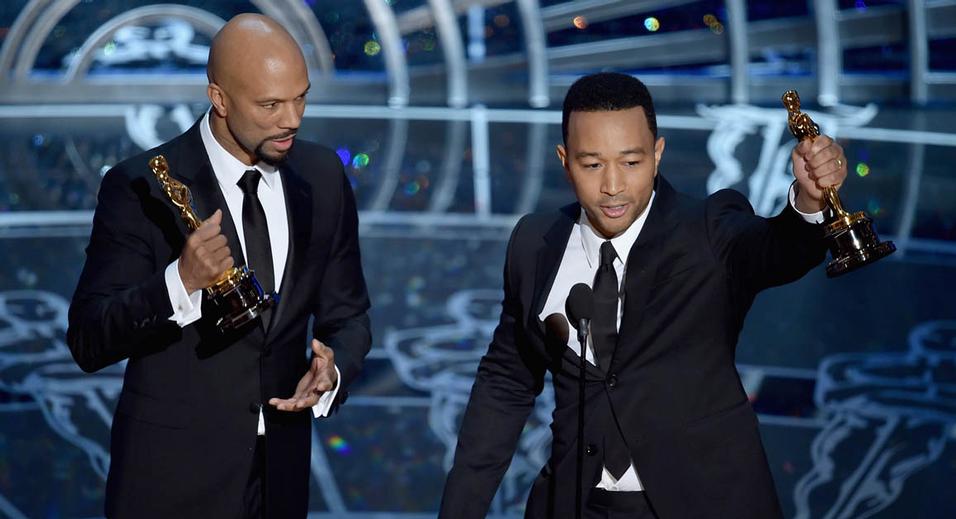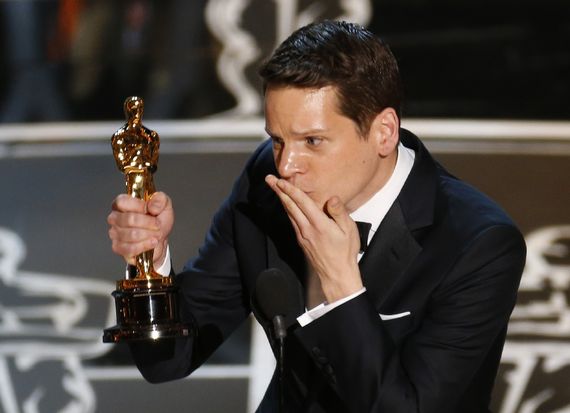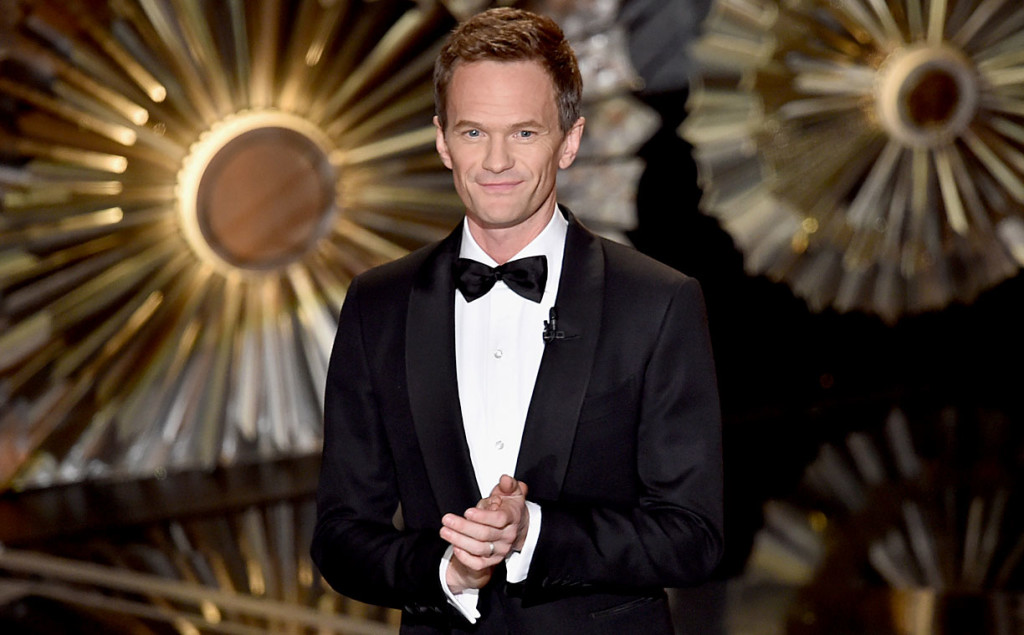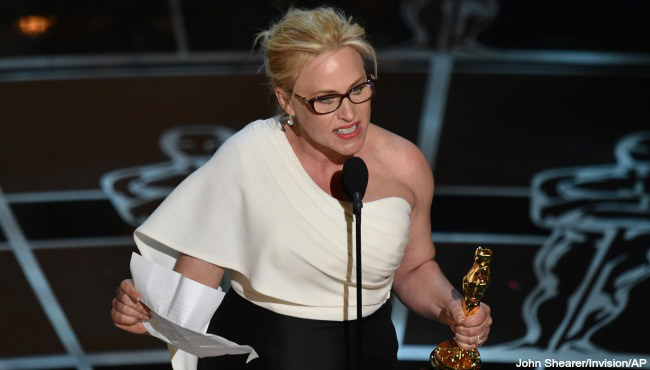Despite falling victim to the ‘Oscar host curse’, the Hedwig alum found moments to call out Hollywood, while the night’s winners used their speeches as a podium for politics.
Author | Demitra ‘Demi’ Kampakis | Film Editor
Featured image: Neil Patrick Harris took to the stage in his tighty-whities to deliver a Birdman spoof. JOHN SHEARER/INVISION/AP.
This last year has been a golden one for Neil Patrick Harris, he starred on Broadway as the raunchy titular drag superstar in Hedwig and the Angry Inch, appeared in American Horror Story: Freak Show where he had his own arc as a deranged magician en route to a full psychotic break, and had his throat slit by Rosemund Pike while playing the creepy Desi Collings in David Fincher’s Gone Girl. But as we’ve seen, experiencing the height of one’s professional mojo can’t guarantee success when it comes to hosting the ceremonious crème de-la crème of Hollywood back patting.
It has often been said that hosting the Oscars is not only a challenging gig, but also a daunting task that will almost always guarantee some degree of backlash, disappointment, boredom, or awkward tension during the brave soul’s 4 hour-long televised feat. Going into it, the host hopes for the best as they brace themselves for the possibility of a few hiccups along the way (usually forced moments of lulled laughter at lackluster jokes), while the threat of a ruined reputation looms. That being said, the potential for doom seemed least likely with the announcement that Neil Patrick Harris would be hosting the penultimate Hollywood shindig. As a four-time Tony and two-time Emmy host, Harris possesses a likeable, competent charm—when in his element, his stage presence commands attention with agile finesse—and there was confidence in his ability to deliver a consistent, entertaining, and seamless night. Yet despite all of Harris’ professionalism, charisma and experience, the night fell flat on many levels—yet there were a few bright spots that gained momentum as one by one, winners began speaking out about issues they believed in.
Putting aside for a moment all controversial politics surrounding the Academy’s underrepresentation of women and minorities, much of the tepid responses to Sunday’s ceremony stemmed from the conspicuous lack of comedy or humor present in the proceedings. In short, this was one of the least funny Oscars in recent memory. Yet this can’t be entirely blamed on Harris, as the actor was given material whose head writer isn’t in comedy. This was established almost immediately during Harris’ opening musical number which included cameos from Anna Kendrick and Jack Black—while passionate and sincere, his vibrant tribute to moving pictures never tried to be all that funny to begin with.
Which is why it would likely have been wiser to let Harris just stick to what he knew best, and let the comedians handle the comedy. Instead, the audience and viewers were treated to a plethora of underwhelming jokes, awkward one-liners, stalled gags and okay puns. Perhaps the most egregious of these blunders was the ongoing shtick involving the Oscar predictions (made even worse by Harris’ insistence that Octavia Spencer guard it at all cost). It was all a bit forced and unnecessary, and Harris seemed to realize this himself, as he attempted to bounce back through poorly timed (though at times somewhat effective) ad-libs—the least successful attempt at improv, however, came when he cracked a joke about a winner’s pom-pom dress seconds after she dedicated her award to her suicidal son.
But credit shall be given where credit is due, and where Harris did shine was in his refreshingly snarky remarks to the Academy for their confounding lack of diversity. Kudos to him for the wise ball busting he delivered on behalf of the lack of recognition given to Selma, The Lego Movie, and female filmmakers in general. Though he tended to overcompensate, which led to several face-palm moments involving blatant attempts to include black actors in poorly conceived bits (the Academy’s version of saying “I have black friends!”) Harris heart was nevertheless in the right place. The host isn’t to blame for the Academy’s whiteness, and by summoning up the well-intentioned chutzpah it took to call out this status quo, he effectively addressed a very real problem with representation.
As if to make up for the awkward boredom that plagued most of the night, winners took to the stage and used their acceptance speeches as a PSA platform for each to speak passionately about various issues ranging from the personal to the socially conscious. Whether it was J.K. Simmons’ sentimental urge for everyone to call and reconnect with their parents, or Common and John Legend’s powerful cries in speaking out about mass incarceration for black men, voting rights, and justice for all, or Alejandro Gonzalez-Inarritu’s heartfelt pleas begging for immigration reform and respect for Mexican immigrants, these unexpected messages were refreshing, satisfying, and poignant in their call for awareness and change.

Although delivered in a murky and imprecise fashion, even Patricia Arquette’s feminist message urging equal pay stemmed from good intentions; “It’s our time to have wage equality once and for all and equal rights for women in the United States of America.” Her words were initially greeted with loud cheers, but it was once she took backstage that her pressroom comments came under fire; “It’s time for women. Equal means equal. The truth is the older women get, the less money they make. The highest percentage of children living in poverty are in female-headed households. It’s inexcusable that we go around the world and we talk about equal rights for women in other countries and we don’t,” she said. “It’s time for all the women in America, and all the men that love women and all the gay people and all the people of color that we’ve all fought for to fight for us now.”
There are a few troubling concerns with this statement. For one thing, it completely disregards the fact that “gay people” and “people of color” include women. Feminists like Roxane Gay took to Twitter to vocalize the tone-deaf nature of Arquette’s plea, which seems to suggest that gay people and people of color have achieved equality while women have not. They’re not wrong—for not only do black and Latina women make less than white women do, but transgender people are four times more likely to live below the poverty line than the general population. Suffice it to say then, that it is not time for “all the gay people” and “all the people of color” to pause their struggles in order to battle for the equality of straight, white women.
Arquette’s comments also seem to ignore the feminist contributions made by both women of color and queer women, which can make these women “hesitant about joining the mainstream movement, which can seem exclusionary and oblivious to intersectionality.” (TIME’s Eliana Dockterman) This is made especially troubling and odd when noting the fact that Arquette has always been openly supportive of transgender equality, as her sister Alexis Arquette is a trans actress.
In their roundup of the “Gayest and Greatest GIFS of the 2015 Oscars,” Queerty noted that “the gayest and greatest moment at the Oscars belonged to [The Imitation Game’s] Best Adapted Screenplay winner Graham Moore,” who took to the stage to deliver these words:
“Alan Turing never got to stand on a stage like this and look out on all these disconcertingly attractive faces. And I do. And that’s the most unfair thing I think I’ve ever heard. And so in this brief time here what I want to use it to do is say this. When I was 16 years old I tried to kill myself, because I felt weird, and I felt different, and I felt like I did not belong. And now I’m standing here. And so I would like for this moment to be for that kid out there who feels like she’s weird or she’s different or she doesn’t fit in anywhere: Yes you do. I promise you do. Stay weird, and then when it’s your turn, and you are the one standing on this stage, please pass this message one.”
Referring to Turing, the film’s protagonist and WWII mathematician who is portrayed as having killed himself because of his homosexuality, Moore’s speech seemed to be using a personal experience as a way of speaking to the LGBTQ struggle. When Moore later clarified, however, that he isn’t gay, the context of his speech seemed to shift and become somewhat confusing. Although the revelation that he is straight doesn’t undermine the emotional impact of his message, it’s odd to note in hindsight how much of the speech was not directly aimed at queer youth. By preceding his anecdote of personal hardship with Turing’s story, Graham is undeniably drawing parallels between individuals who are persecuted for their homosexuality and those at risk for suicide—so it becomes all the more strange when this parallel was never intended.

In correlating the persecution facing queer youth and teens who may feel weird and different, Graham dangerously undermines the greater evils behind homophobic prejudice, as if to suggest it is on par with being labeled a social outcast. So whether the emphasis is made between queer struggles and weirdness, or queer youth and the increased risk of suicide, such associations are regressive and damaging. As The Atlantic’s Spencer Hornbacher and Slate’s J. Bryan Lowder point out, “Stay weird” isn’t advice that would have helped Turing,” and “thinking of homosexuality (or bisexuality or transgenderism) as weird is, in a way, precisely the problem.” This does make the gay rights activism that accompanied The Imitation Game’s awards-season campaign seem a bit more opportunistic.
Ending on a higher note, the other Moore (Julianne, not related to Graham) used her speech as an opportunity to spread awareness of the devastating affliction brought on by Alzheimer’s Disease; “I’m so happy – I’m thrilled actually that we were able to hopefully shine a light on Alzheimer’s disease.” Moore concluded her speech with a riveting and tender tribute to husbands and Still Alice co-writers/co-directors Wash Westmoreland and Richard Glatzer, “And finally, to our filmmakers, Wash Westmoreland and Richard Glatzer, who had hoped to be here tonight but they can’t because of Richard’s health. When Richard was diagnosed with ALS, Wash asked him what he wanted to do. Did he want to travel? Did he want to see the world? And he said that he wanted to make movies and that’s what he did.”
Shortly before they signed on to write the script for the film, Glatzer was diagnosed with ALS, and the degenerative nature of Glatzer’s disease gave the character of Alice a personal familiarity that prompted the couple to want to tell her story (because health issues rendered him unable to speak, he would give direction on set via an iPad app). Still Alice isn’t imbued with the same gay sensibilities the couple have been known for in their previous films; here, they deliver a focused portrait of suffering that’s made all the more haunting by the connection shared between the artists and their work.


